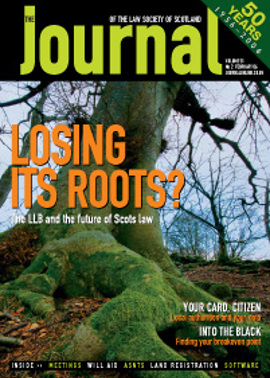The Pagan mission

So there you are, minding your business as a solicitor offering will drafting, when in comes this letter from the lawyer who started Will Aid, saying Will Aid isn’t what it used to be and he’s having a Scottish Will Aid and would you like to support his Will Aid rather than the other Will Aid he started. Confused?
Graeme Pagan, for it is he, is unabashed. “It was always the ethos of Will Aid that the money raised should be used for the relief of poverty overseas”, he maintains. “That was the condition on which I gave my blessing to the use of the name in the first English campaign around 1990. But the last campaign used money to benefit people in the UK, which is contrary to its whole principles.”
It has all come a long way from a supposedly one-off event to mark the centenary of the Oban Faculty in 1988. Memories were fresh then of the original Band Aid/Live Aid appeals, revived at the time of last year’s G8 summit. Looking for something different to commemorate the Faculty event, Pagan was fixed with the thought, if pop stars can help the Third World, why can’t solicitors?
The idea was simple. Then as now, a large proportion of the public for whatever reason had put off making any testamentary provision. Law Society of Scotland publicity campaigns had limited impact. Why not encourage potential clients with the promise that they could both take a sensible step for themselves and at the same time benefit a deserving cause overseas? For a limited period, offer them the chance to make a will with a charity donation in place of a fee.
“I saw it as a small step to do something to redress the imbalance in the world”, says Pagan. “If a firm was reluctant to take part, I would tell them it was a once in a lifetime opportunity!”
And, as has often been said, a will in the safe is a good investment.
From the word go, the profession seized on the idea – about 500 firms took part in the first campaign. The £90,000 proceeds showed that the message to the public was a winner as well. “It opened the public up to us”, Pagan comments. “It helped overcome the reluctance people sometimes seem to have even to come into our offices.”
The promise to his fellow Scots that Will Aid would be a one-off event held good in 1990, when lawyers in England and Wales took up the idea, but by about 1992 popular demand led to the first UK-wide scheme. Since then it has run every two years.
Often approached by home-based charities such as hospices, Pagan would turn them all down in order to keep to his original ideal.
For the early campaigns administration was simply by an informal consortium between the charities. As Will Aid grew, a full time team was appointed, plus publicity people and the rest. Pagan himself didn’t see the need to remain at the centre. “Scotland was represented through someone from the Scottish Catholic International Aid Fund and the thing was running well”, he explains. “The benefiting charities changed but the money always went to overseas projects – for example when the Red Cross joined, they promised it would go to their work in developing countries.”
Awarded the MBE in 1998 for his efforts, Pagan was surprised to receive a questionnaire prior to the 2004 campaign, asking how he would react if non-overseas charities were brought in. “I wrote to the organisers and said I couldn’t possibly support it, but within a week or two the announcement was made.” So it came about that the campaign that year supported not only the traditional causes, but also the NSPCC (which doesn’t even have a Scottish operation) and Help the Aged – also primarily an England and Wales organisation.
Reluctant as he was to immerse himself in campaigning again – “I’m busy enough in my own life and would have been happy just to see it grow” – Pagan felt he had to take a stand. “The imbalances in the world are getting worse. Small sums go such a long way in the Third World. A pound can save someone’s sight; £2 can provide an Aids test for a raped woman.”
He is convinced that this ethos ensured the success of the first campaign. “The original Will Aid had to be overseas and I’m sure that’s why Scotland responded the way it did.” And in the wake of the Indian Ocean tsunami and the south Asian earthquake disasters, he is equally certain that Scottish solicitors remain as supportive of the idea of helping less fortunate countries.
Hence the formation of Solicitors Will Aid Scotland, a charitable company limited by guarantee whose directors are Pagan and Alistair Carmichael, solicitor and now MP for Orkney and Shetland. Hence too, the forthcoming May campaign and the literature now inviting Scottish solicitors to respond.
As for beneficiaries, Pagan is not only ensuring the money is used exclusively overseas, but selecting smaller, Scottish-based charities dedicated to extracting maximum benefit from each pound raised (see box). “It’s a guarantee they offer to supporters”, says Pagan. “They are all extremely concerned to make sure that money is well used.”
The May campaign will operate in the familiar way – the organisers will compile a register of participating solicitors to whom to refer enquiries from members of the public; for the duration of the campaign, solicitors offer to draw up wills with a suggested donation in lieu of fees. Pagan is concerned to emphasise the flexibility for those taking part.
“If you’re worried you will be inundated, you’re free to stop. Or if a will starts to get too complicated. Also if you have too many people coming to you at once, you could book some in for the following month – it can still be counted.”
Looking ahead, he hopes to establish the new campaign as a biennial feature. “If you run it every year people will put it off and say they’ll make their will next year. If it’s only every two years they’re more likely just to decide to go ahead.”
Perhaps not surprisingly, there have been rumblings from the south about a rival organisation bearing the Will Aid name. As the creator of both the concept and the name, Pagan is unapologetic.
“The present consortium in the south have breached Will Aid’s ideals and openly admit that some of the 2004 Will Aid money was spent on projects in England. This betrayal of the Will Aid ideal was undertaken without consultation with the solicitors involved. I believe that many of them want Will Aid to be kept for its true objectives.”
The disagreement may be unfortunate, he adds, but solicitors still have the choice whether to support his campaign or the UK-wide Will Aid – which continues its two-yearly cycle this coming November. The company Solicitors Will Aid Scotland has been registered for use only in Scotland, and Pagan has no ambition to expand south of the border.
His closing shot returns to the question of ethos. “Will Aid is not just about raising more and more money, however useful that might be. Will Aid has to do with the whole ethos of giving and encouraging people to think about and do more for those less fortunate than themselves. That involves the desire to break down geographical boundaries and to unite the whole world as one, with the disadvantaged being helped by the privileged.”
A little over a week after his first circular, 100 firms had signed up. To Graeme Pagan, “That proves conclusively that solicitors in Scotland want to keep Will Aid to what it was intended for.”
To join in the Will Aid Scotland campaign, contact Graeme Pagan at Hosack & Sutherland, Queens Building, George Street, Oban PA34 5RZ, or visit www.willaidscotland.co.uk
The five charities taking part in this year’s Will Aid Scotland campaign are:
Blythswood Care
Based in Evanton, Ross-shire, Blythswood Care provides disaster relief, care projects to enable young people fulfil their potential, and gospel outreach. Last year, it sent financial help and 17 containers of aid to tsunami survivors in five countries.
EMMS International
Operating as Emmanuel Healthcare, Edinburgh-based EMMS, in partnership with local Christian organisations, supports hospital, clinic and nursing projects in countries including India, Nepal and Malawi, dealing with Aids and leprosy among other diseases.
Mission Aviation Fellowship
Organised from Glasgow, Mission Aviation Fellowship flies light aircraft to remote areas in over 30 developing countries in support of church, mission and relief agencies.
Scottish International Relief
Founded during the Bosnian war in 1992, SIR works with some of the poorest people around the world, providing homes for street children, school meals for the undernourished and relief following disasters like the tsunami. It ensures the necessary organisation is in place locally before it sends any money. Its base is Dalmally, Argyll. (Graeme Pagan declares an interest as an unpaid director of SIR.)
Signpost International
www.signpost-international.org
Another charity committed to supporting the poorest children and families, Dundee’s Signpost International styles itself a “young, developing and inclusive Christian organisation”, “a charity that provides assistance without favour, purely on the basis of need”, and one that will work with any aid organisation prepared to support its aims.
In this issue
- Legal aid in children's hearing referrals
- Still waters run deep
- Catch-up or patch-up?
- Legal science or law-lite?
- Heads above water
- Your name on file
- A welcome addition
- Another ***** meeting?
- A neglected asset
- Planning a year of action
- The Pagan mission
- A good case to read
- Jurisdiction: dispelling the myth
- That special something
- The art of cashing in
- Scottish Solicitors' Discipline Tribunal
- Website reviews
- Book reviews
- In on the Act
- Keeper's corner






